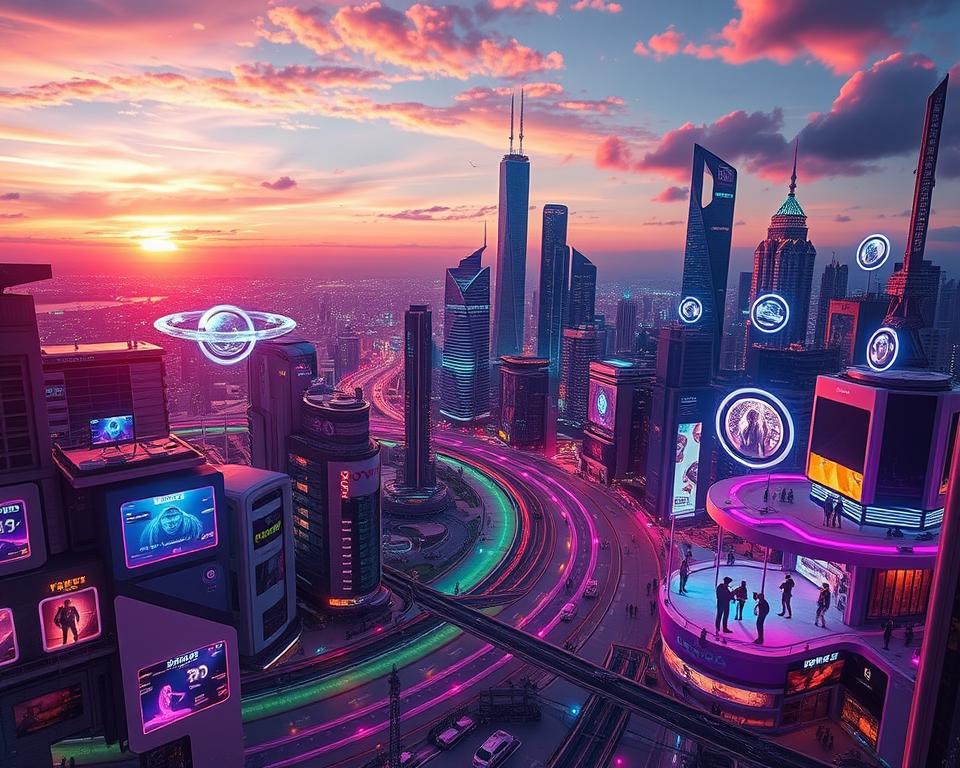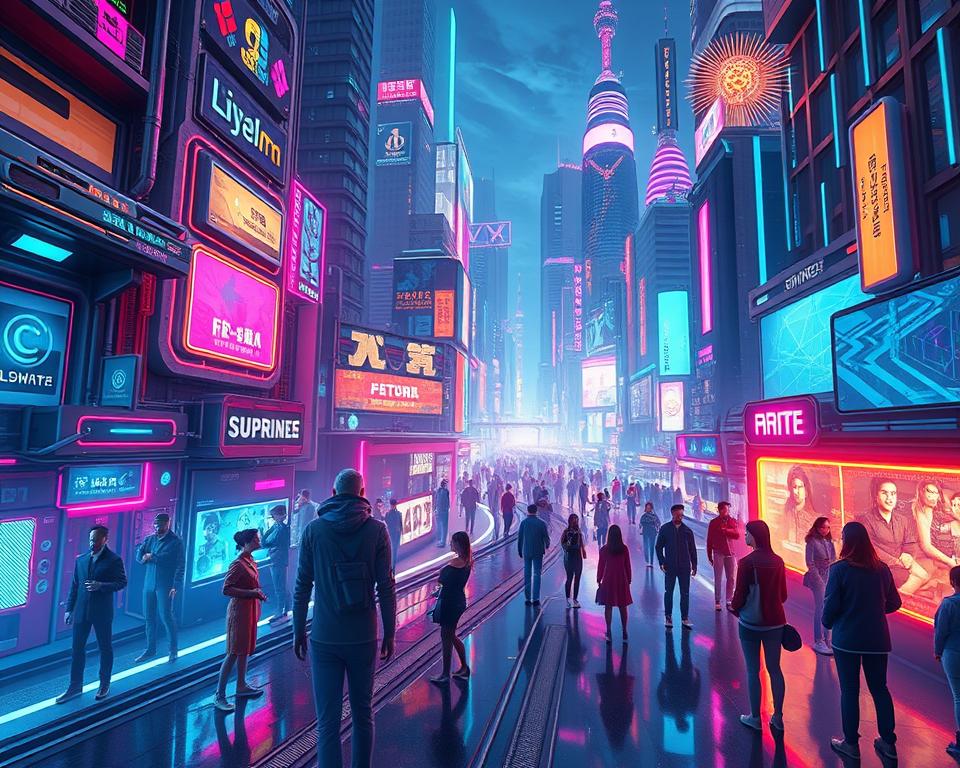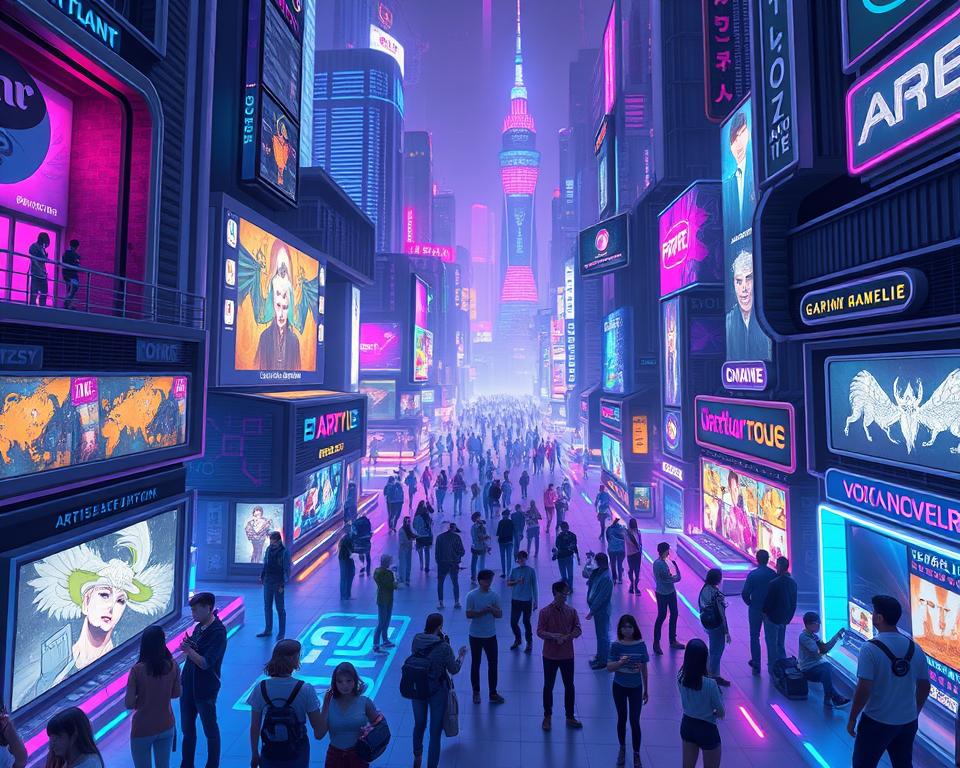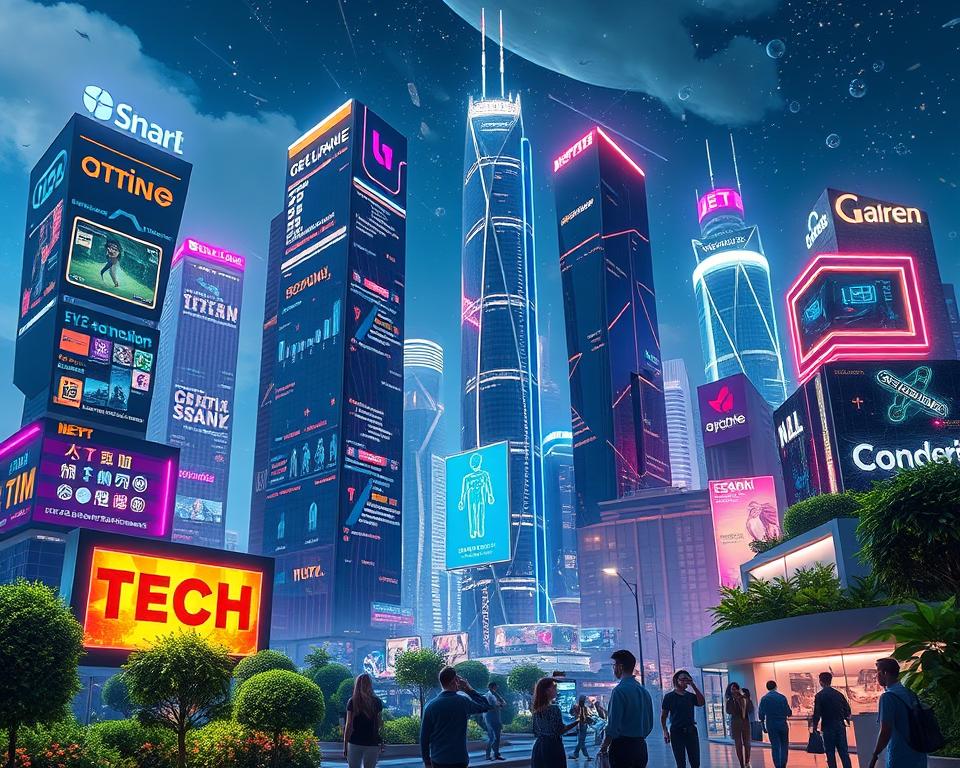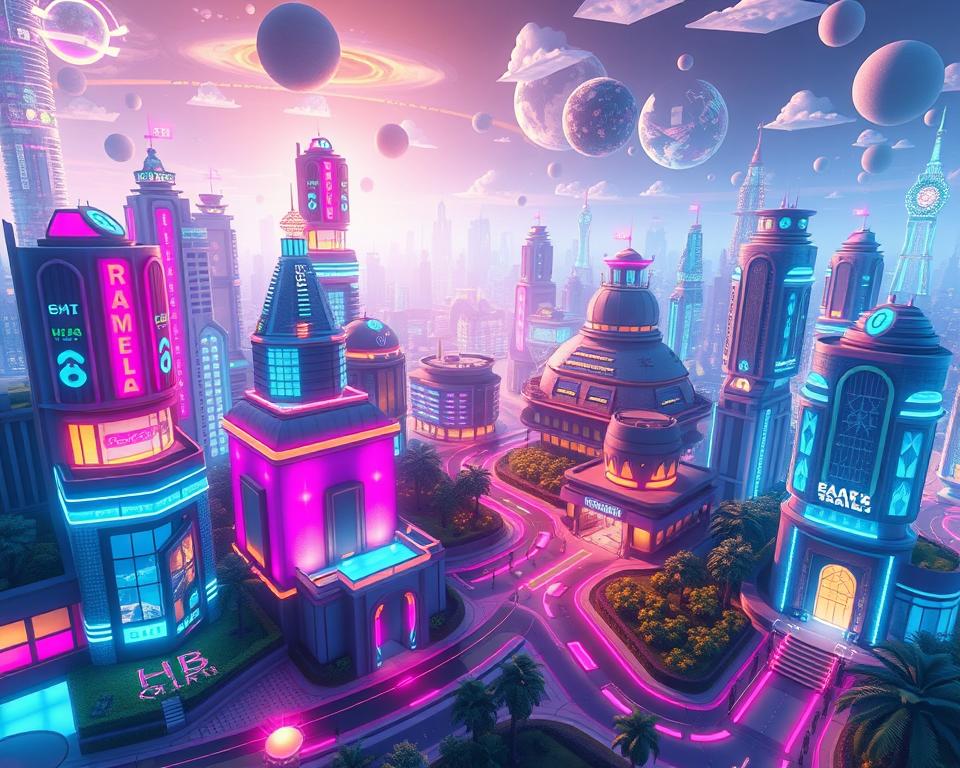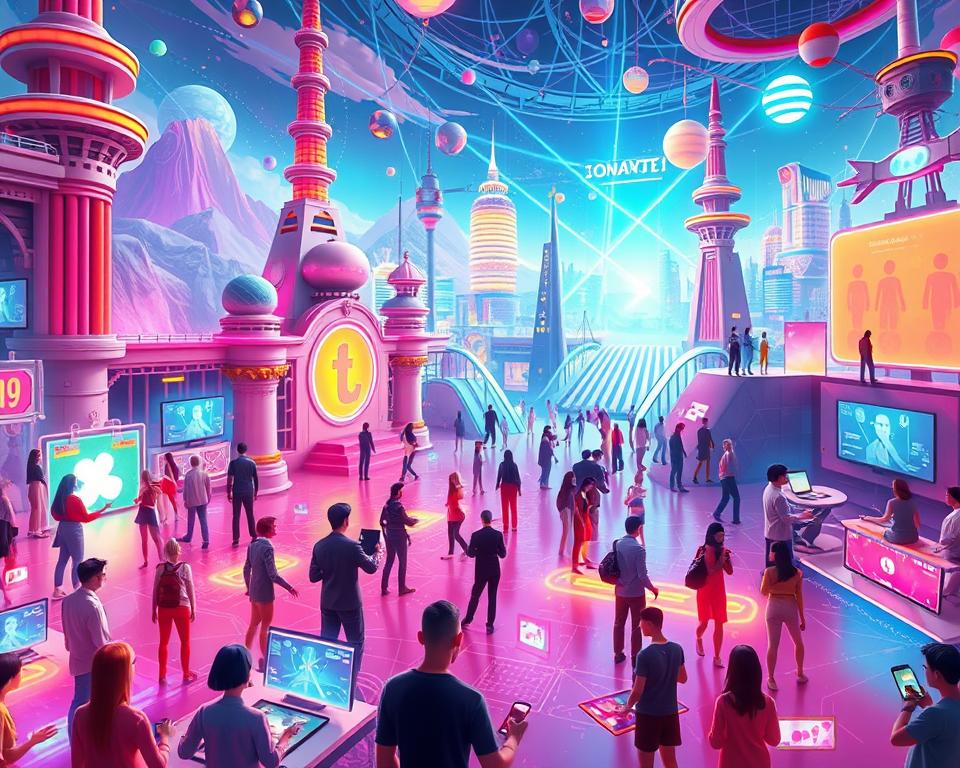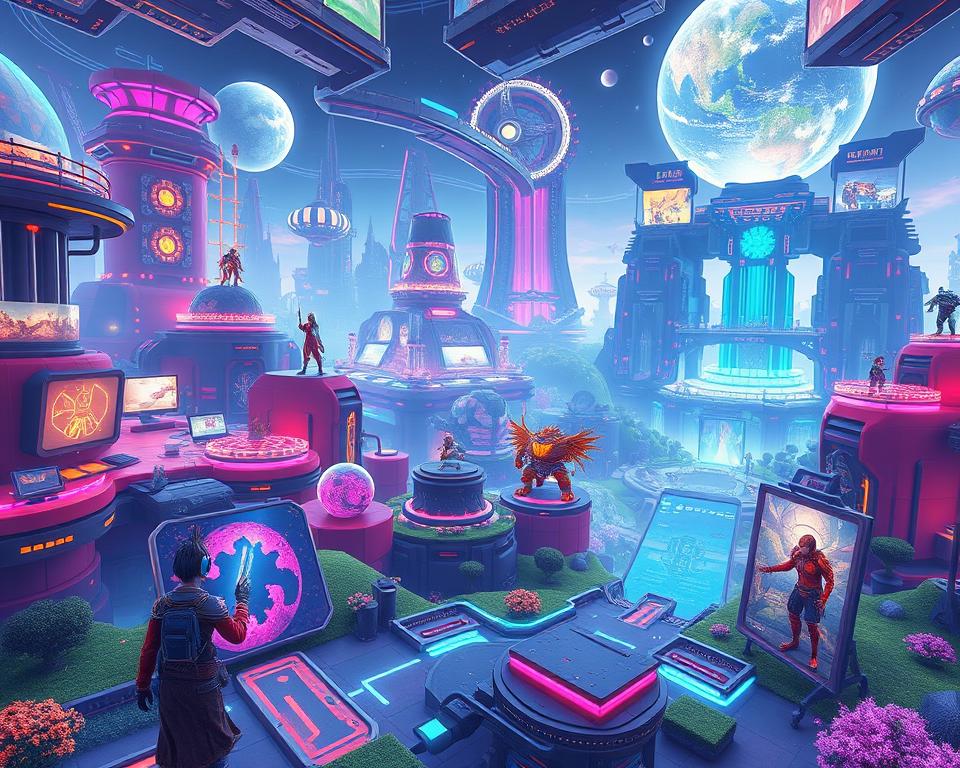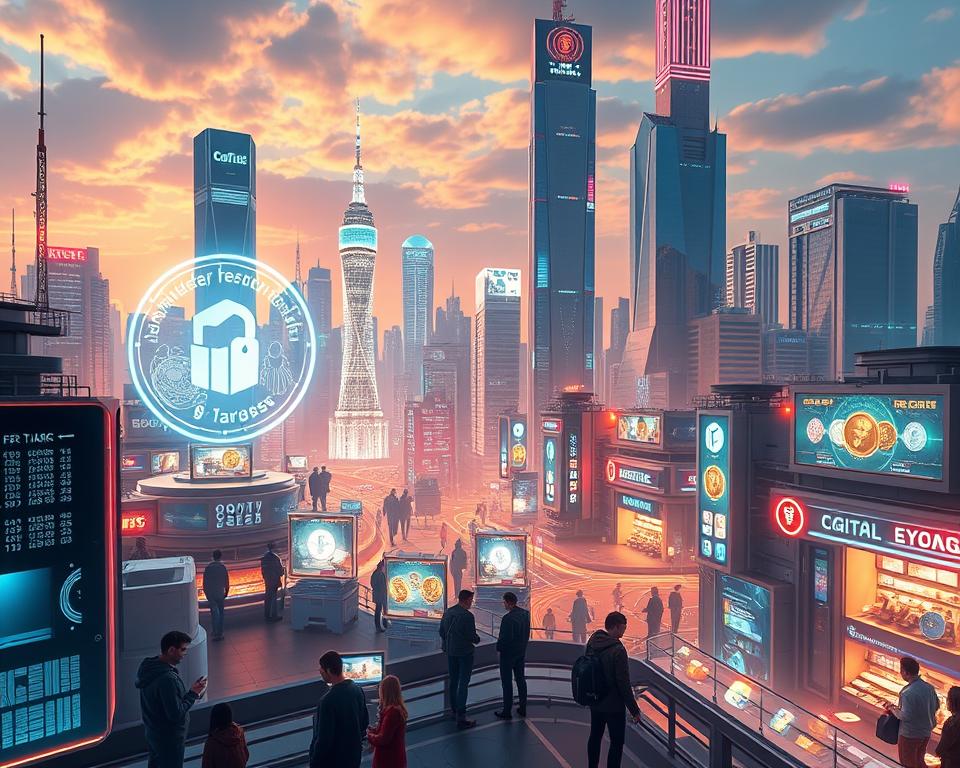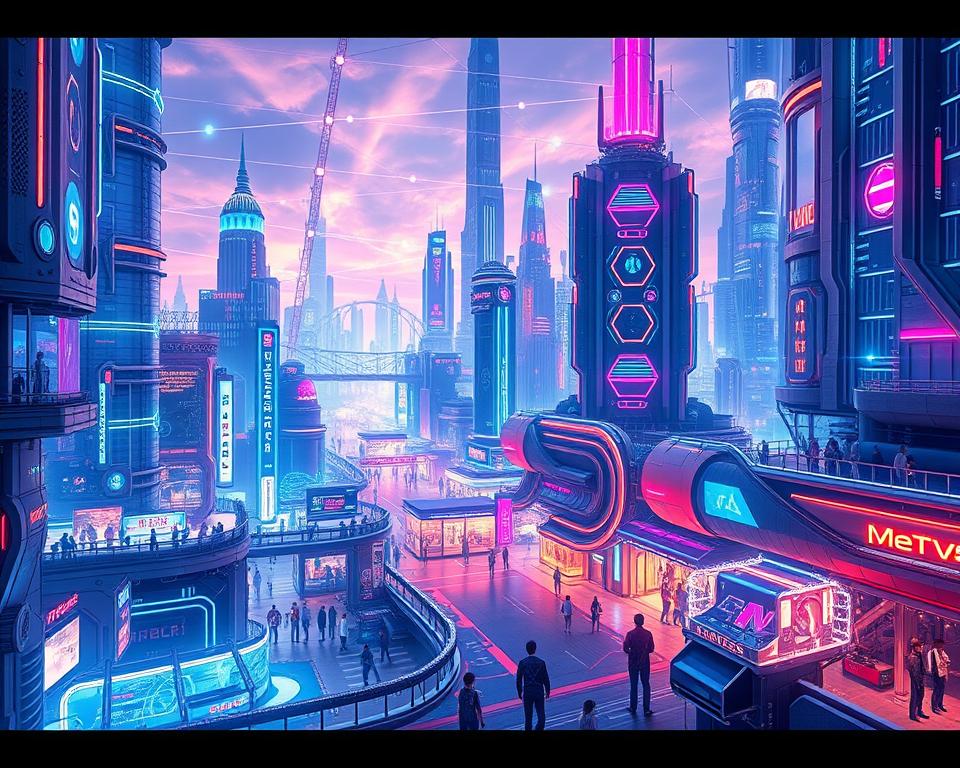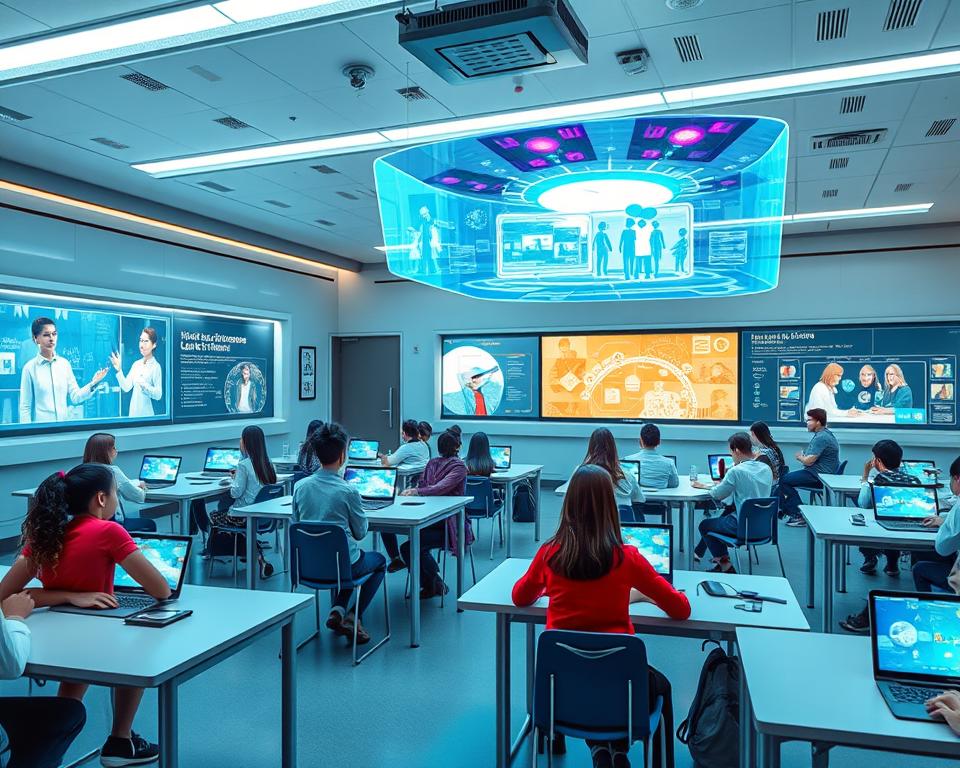The metaverse is a new concept that mixes virtual reality, augmented reality, and blockchain. It’s changing the digital world fast. It’s making the lines between the real and digital worlds fade away.
This change is making how we interact, work, and play different. It’s affecting many industries in big ways.
Big tech companies like Meta, Microsoft, and others are leading this change. They’re creating virtual worlds where people can explore, socialize, and own digital things. These worlds are made possible by new tech like VR, AR, and Web3.
Table of Contents
Key Takeaways
- The metaverse is a new digital world that combines virtual reality, augmented reality, and blockchain technology.
- Big tech companies are making virtual worlds that let people interact, own things, and have fun in new ways.
- The mix of VR, AR, and Web3 is making the metaverse grow fast and get more popular.
- The metaverse is changing many areas, like entertainment, business, education, and healthcare.
- It’s important to figure out how to handle the rules and privacy in the metaverse as it keeps growing.
Understanding the Evolution of Virtual Worlds
The history of virtual worlds is a fascinating story of tech progress. It shows how we got from early virtual reality tests to today’s metaverse. This journey has been truly amazing.
From Early Virtual Reality to Modern Metaverse
In the 1960s, Ivan Sutherland created the first head-mounted displays. This was the start of AR/VR technology. Over time, better graphics, faster computers, and easier interfaces turned these early ideas into today’s metaverse.
Key Technologies Driving Virtual Evolution
Many new technologies have helped virtual worlds grow fast. Artificial intelligence, blockchain, and 5G connectivity are key. They make virtual spaces more real, connected, and open to everyone.
| Technology | Role in Metaverse Evolution |
|---|---|
| Artificial Intelligence | Enhancing virtual experiences through personalized interactions, intelligent avatars, and seamless integration of physical and digital worlds. |
| Blockchain | Enabling secure, decentralized ownership and transactions of digital assets, including non-fungible tokens (NFTs), within the metaverse. |
| 5G Connectivity | Providing the high-speed, low-latency data transmission required for real-time, immersive virtual experiences across multiple devices and platforms. |
As these technologies keep getting better, the future of virtual worlds looks even more exciting. It will change how we live, work, and play online.
Current State of Metaverse Developments
The metaverse is a mix of virtual reality, augmented reality, and digital worlds. It’s growing fast, thanks to more people using virtual reality and digital platforms. This shows a quick change in the metaverse world.
Many popular metaverse platforms are now available. Big names like Meta (Facebook) and Microsoft are leading the way. They offer virtual worlds where people can socialize and try new things.
More people are using virtual reality, which helps the metaverse grow. Cheaper VR headsets make it easier for everyone to join in. Now, people use the metaverse for fun, work, and learning.
Technologies like better graphics and sound make the metaverse more real. These updates make the virtual world feel more like the real one. This makes more people want to be a part of it.
We’re seeing big changes in the metaverse. It’s opening up new chances for everyone. The future looks very exciting.
Major Tech Companies Shaping the Metaverse Landscape
The metaverse is growing fast, thanks to big tech companies. Meta (formerly Facebook), Microsoft, Google, Apple, and Nvidia are leading this digital revolution.
Meta’s Strategic Initiatives
Meta, Facebook’s parent, is moving big into the metaverse. They’re focusing on virtual reality and investing in new tech. This includes cool headsets and augmented reality apps. Meta wants to make virtual experiences fun and easy for everyone.
Microsoft’s Enterprise Solutions
Meta is for consumers, but Microsoft is for businesses. Their Microsoft Mesh is a metaverse for work. It uses cloud tech, mixed reality, and AI to improve work in virtual spaces.
Other Key Players and Their Contributions
- Google is working on Google AR to make augmented reality part of our daily lives.
- Apple is said to be making VR and AR headsets. This could make them a big name in the metaverse.
- Nvidia‘s Omniverse is a place for 3D design and simulation. It helps creators build and connect virtual worlds.
These tech giants are changing the metaverse with smart partnerships and new tech. Their work will change how we interact and experience the digital world.
Virtual Real Estate and Digital Property Markets
The metaverse is bringing a new era of virtual real estate. Digital assets are becoming more valuable. Investors, developers, and individuals are all interested in this market.
Platforms like Decentraland and The Sandbox are at the forefront. They let users buy and develop virtual land. This land can be used for homes, businesses, events, and more.
Virtual land sales are getting a lot of attention. For example, Decentraland saw a record-breaking sale of $2.4 million in 2021. This shows the growing interest in metaverse real estate.
| Platform | Notable Virtual Land Sales | Potential Use Cases |
|---|---|---|
| Decentraland | $2.4 million for a single plot | Virtual homes, businesses, events |
| The Sandbox | $4.3 million for a virtual land parcel | Virtual gaming, entertainment, advertising |
The virtual land and digital assets markets are growing fast. This means more opportunities for investment, development, and fun in the metaverse.
“The metaverse is no longer a distant vision, but a tangible reality where virtual real estate is becoming a valuable commodity.”
The rise of metaverse real estate shows how the physical and digital worlds are coming together. People and businesses want to make their mark in this new frontier.
Social Interaction in the Metaverse
The metaverse is changing how we connect online. Virtual social platforms are key in this change. They help us interact and form communities in digital spaces.
Virtual Communities and Social Networks
In the metaverse, virtual communities are growing. They offer places for people to meet, work together, and share interests. VRChat is a big example. It lets users create their own virtual worlds, creating a sense of community.
Social networks in the metaverse are also changing. They let us create digital identities and connect with others. These networks are making online communication more interactive and personal.
Digital Identity and Avatar Technology
Digital identity and avatars are central to metaverse social interaction. Users can make unique digital avatars that show who they are. These avatars can reflect our style and personality, even with the latest virtual fashion.
The metaverse is getting bigger, and so is our ability to connect online. Virtual social platforms, digital avatars, and communities are shaping our digital world.
“The metaverse is not just about technology, but about the social experience it enables. It’s about coming together, connecting, and creating in new ways.”
Gaming Industry’s Role in Metaverse Growth
The gaming world has been key in the metaverse’s growth. Games like Roblox and Fortnite have led the way. They’ve turned into virtual worlds where people can play, socialize, create, and even earn money.
Blockchain technology has also played a big role. Blockchain games let players own digital assets. They can buy, sell, and trade these assets as NFTs. This has created new ways for players to make money in the real world.
| Platform | Key Features | Metaverse Integration |
|---|---|---|
| Roblox | User-generated games, virtual economy, social features | Evolving into a comprehensive metaverse platform |
| Fortnite | Battle royale gameplay, live events, cross-platform play | Expanding beyond gaming into a virtual social hub |
| Decentraland | Blockchain-based virtual world, user-owned land and assets | Pioneering the integration of blockchain and the metaverse |
The gaming world is always changing and growing. We’ll see new and exciting experiences and ways to make money. These changes will make the virtual and real worlds closer together.
“The metaverse is the next evolution of social connection. Our goal is to help bring the metaverse to life, so we are focused on building connectivity between digital spaces and expanding human expression and social interaction.”
– Mark Zuckerberg, Founder of Meta (formerly Facebook)
Economic Opportunities in Virtual Worlds
The metaverse is growing, bringing a new digital economy with it. This economy offers chances for both individuals and businesses. Digital commerce and virtual marketplaces are leading the way, changing how we deal with digital goods.
Digital Commerce and Virtual Marketplaces
The metaverse has created a booming digital commerce world. Here, people can make deals easily with cryptocurrency and other digital payments. These markets are filled with digital items, from virtual homes and clothes to digital collectibles and NFTs.
NFTs and Digital Asset Ownership
Non-fungible tokens (NFTs) have changed the game in the metaverse. They make it safe and clear to own digital items. NFTs let users collect, trade, and even make their own digital collectibles in the virtual economy.
The metaverse is opening up big chances for business and growth. It’s a new world for making and selling digital items, or for getting into NFT marketplaces. The metaverse is a new frontier for making money in the virtual economy.
“The metaverse represents a fundamental shift in how we interact with technology and each other, and it’s clear that it will have a profound impact on the global economy.”
Metaverse Infrastructure and Technology
The metaverse is growing, and its tech backbone is key to its future. Cloud computing, edge computing, 5G networks, and haptic feedback are crucial. They must work together smoothly for the metaverse to succeed.
Cloud computing is a big help, offering the power and storage needed for the metaverse’s virtual worlds. Edge computing brings processing closer to users, cutting down on delays and improving their experience.
5G networks are vital, providing fast, reliable connections for real-time interactions in the metaverse. These networks make virtual experiences faster and more responsive.
Haptic technology is changing how we interact with virtual objects. It adds a real touch to virtual worlds, making them feel more real and immersive.
“As the metaverse evolves, the underlying technological infrastructure will become increasingly critical in shaping the future of virtual worlds.”
These advanced technologies must come together for the metaverse to offer top-notch experiences. This includes everything from gaming and fun to learning and training.
Virtual Education and Training Platforms
The metaverse is changing education and corporate training. It brings new virtual classrooms, immersive learning, and VR training simulations. Technology keeps getting better, making online education and virtual reality training more possible. This offers new ways to meet the needs of students, teachers, and corporate workers.
Corporate Training Applications
Virtual reality is changing employee training in companies. VR training lets employees practice skills like crisis management and customer service safely. This approach improves learning and teamwork.
Educational Institutions in the Metaverse
- Virtual Classrooms: Schools are using the metaverse for virtual classrooms and campuses. Students can attend lectures and work on projects in a digital world.
- Personalized Learning: The metaverse offers learning tailored to each student. Students can learn at their own pace and get feedback from virtual teachers.
- Hands-on Experimentation: Virtual labs let students try things that are hard or dangerous in real life. This makes learning more interactive.
The metaverse is changing how we learn and train. It promises to make education and skill-building better in the future.
| Advantages of Virtual Education and Training | Challenges of Virtual Education and Training |
|---|---|
|
|
The metaverse is changing education and training. It promises to make learning and skill-building better in the future.
Healthcare Applications in the Virtual Reality Space
The metaverse is changing the game, not just for fun and socializing but also for healthcare. It’s bringing new ideas to telemedicine, VR therapy, medical training, and mental health. This virtual world is making a big impact on healthcare.
VR therapy is a game-changer for mental health. VR therapy helps treat anxiety, phobias, and PTSD. It lets patients face their fears in a safe, virtual space. This helps them overcome their anxieties with support.
The metaverse is also changing medical training. Medical training simulations in VR let doctors practice without risk. They can try out complex surgeries and procedures safely, without harming real patients.
| Application | Benefits |
|---|---|
| Telemedicine | It makes healthcare more accessible, especially for those in remote areas. It also lets people get medical advice from anywhere. |
| VR Therapy | It offers a new way to treat mental health issues like anxiety and PTSD. It’s interactive and immersive. |
| Medical Training Simulations | It’s a safe way for doctors to practice. They can try out complex procedures without risking patient safety. |
The metaverse is still growing, and healthcare is just starting to see its potential. It could lead to better patient care, more effective training for doctors, and a more personal healthcare experience for everyone.
“The metaverse has the potential to revolutionize the way we deliver and experience healthcare, transforming it into a more accessible, personalized, and effective system.”
Entertainment and Media in the Metaverse
The metaverse is changing how we enjoy entertainment and media. It offers immersive experiences like virtual concerts and digital art galleries. This new world is reshaping how we engage with entertainment.
Virtual Concerts and Events
The metaverse has seen amazing virtual performances. Artists use new tech to create stunning shows. Fans can enjoy concerts and events from home, surrounded by interactive digital worlds.
Digital Art Galleries and Museums
Artists are exploring new ways to create in the metaverse. Digital art and immersive stories are showcased in virtual galleries and museums. These spaces let art lovers see digital masterpieces in unique, cinematic settings.
| Metaverse Entertainment Experiences | Key Features |
|---|---|
| Virtual Concerts |
|
| Digital Art Galleries |
|
The metaverse is changing the entertainment and media world. It’s offering new ways to experience art and stories. This shift is bringing us closer to immersive and interactive digital adventures.
“The metaverse is not just a technological advancement, but a transformative shift in how we experience and interact with entertainment and art. It’s a new frontier that challenges our traditional notions of creativity and engagement.”
Privacy and Security Challenges
The metaverse is growing fast, and keeping data protection and cybersecurity is a big issue. Digital identities and sensitive info are shared more, making strong digital identity management and metaverse regulations key.
Protecting user privacy is a major challenge. With avatars and virtual chats, personal data is at risk. Fixing these data protection problems is vital for trust and adoption.
The metaverse’s connections and interactions bring new cybersecurity dangers. Hackers could steal data or mess with the whole system. We need strong cybersecurity and plans to handle attacks.
As the metaverse grows, we need clear metaverse regulations and rules. These should cover privacy, security, and ethics. This will help the metaverse stay safe and trusted.
“The metaverse marks a big change in tech and human interaction. We must focus on privacy, security, and ethics to make a safe virtual space.”
By tackling these privacy and security challenges, the metaverse can reach its potential. It will offer immersive experiences and new chances, all while keeping users’ trust.
Regulatory Framework and Legal Considerations
The metaverse is growing fast, and lawmakers are trying to keep up. They aim to create rules that work across the globe. This is hard because the metaverse knows no borders and needs worldwide agreement.
Global Governance Issues
The metaverse’s global nature makes it hard for laws to catch up. Questions about where laws apply, taxes, and enforcing rules in virtual spaces are big. To keep the metaverse safe, efforts are being made to create global guidelines.
Data Protection Standards
Personal data handling in the metaverse is a big privacy worry. Strong data protection rules are needed to protect users and build trust. Lawmakers are updating old privacy laws to fit the metaverse’s needs. They’re focusing on digital identity, avatar privacy, and managing user data.







